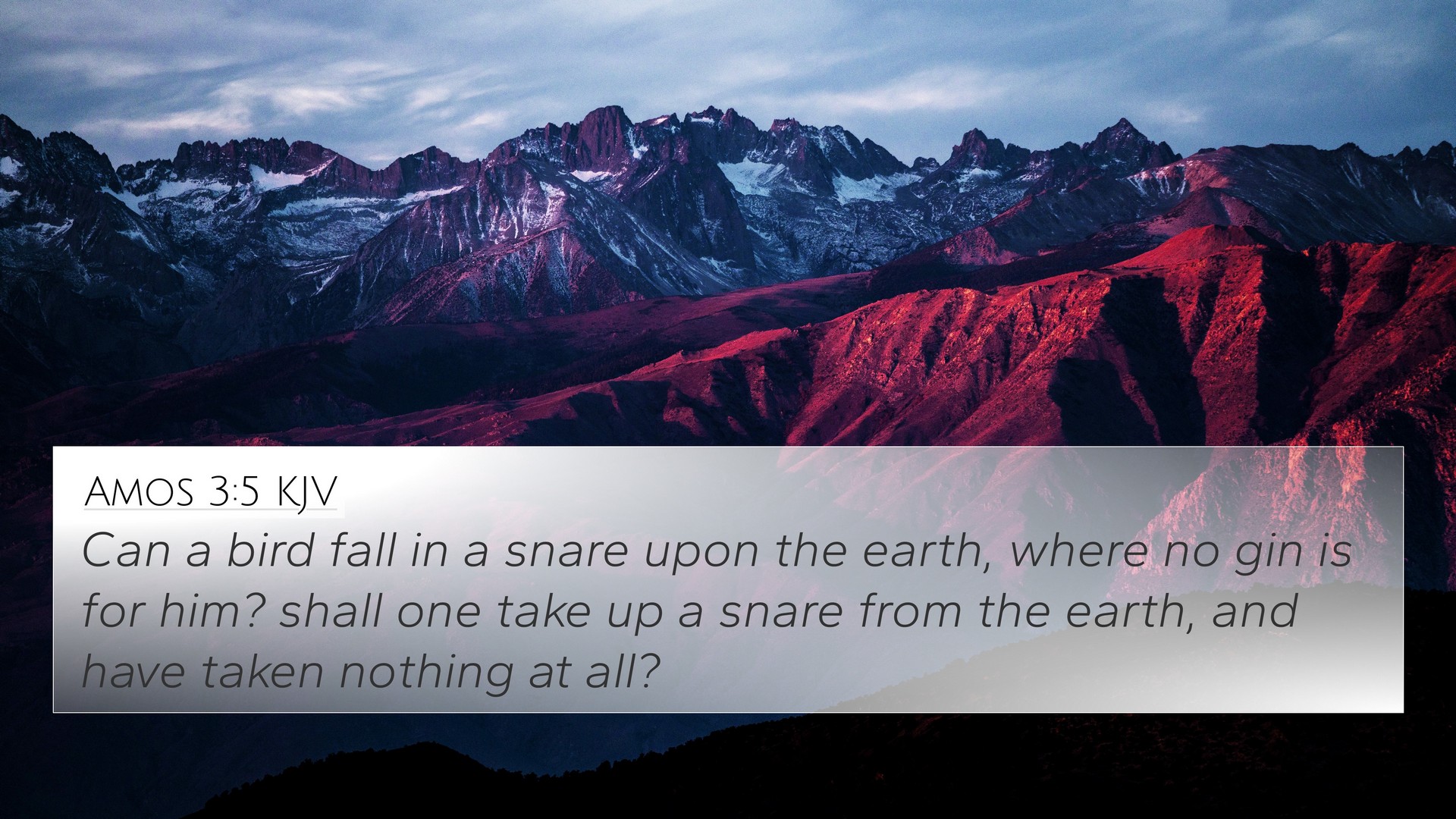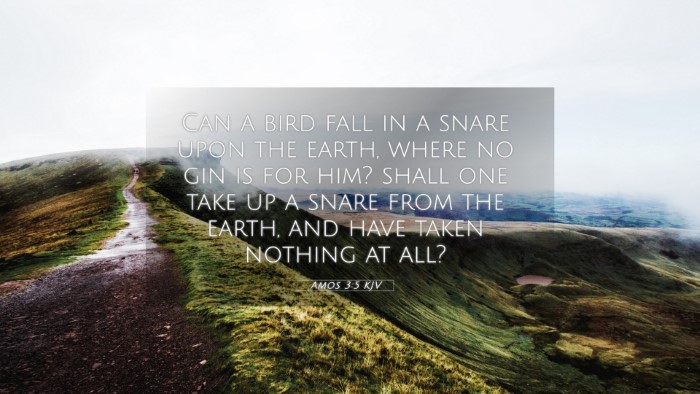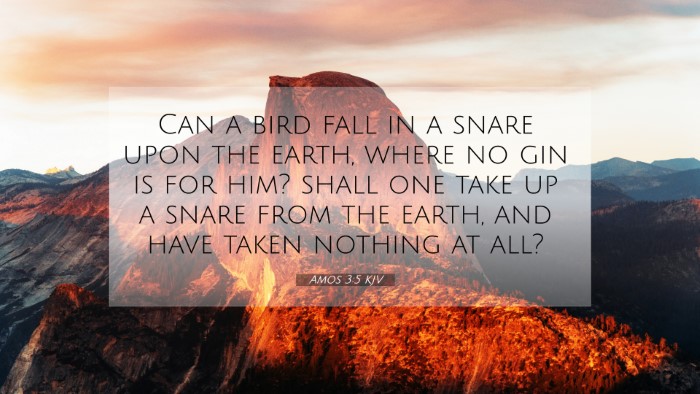Old Testament
Genesis Exodus Leviticus Numbers Deuteronomy Joshua Judges Ruth 1 Samuel 2 Samuel 1 Kings 2 Kings 1 Chronicles 2 Chronicles Ezra Nehemiah Esther Job Psalms Proverbs Ecclesiastes Song of Solomon Isaiah Jeremiah Lamentations Ezekiel Daniel Hosea Joel Amos Obadiah Jonah Micah Nahum Habakkuk Zephaniah Haggai Zechariah MalachiAmos 3:5 Similar Verses
Amos 3:5 Cross References
Can a bird fall in a snare upon the earth, where no gin is for him? shall one take up a snare from the earth, and have taken nothing at all?
Uncover the Rich Themes and Topics of This Bible Verse
Listed below are the Bible themes associated with Amos 3:5. We invite you to explore each theme to gain deeper insights into the Scriptures.
Amos 3:5 Cross Reference Verses
This section features a detailed cross-reference designed to enrich your understanding of the Scriptures. Below, you will find carefully selected verses that echo the themes and teachings related to Amos 3:5 KJV. Click on any image to explore detailed analyses of related Bible verses and uncover deeper theological insights.
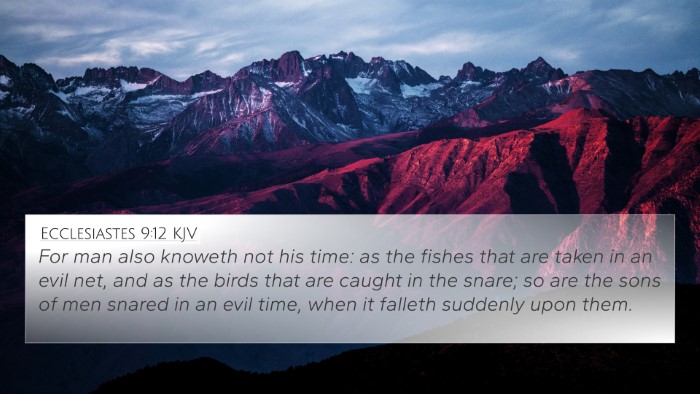
Ecclesiastes 9:12 (KJV) »
For man also knoweth not his time: as the fishes that are taken in an evil net, and as the birds that are caught in the snare; so are the sons of men snared in an evil time, when it falleth suddenly upon them.
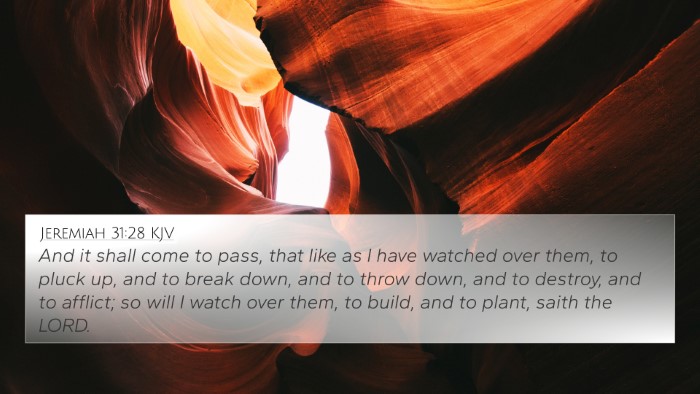
Jeremiah 31:28 (KJV) »
And it shall come to pass, that like as I have watched over them, to pluck up, and to break down, and to throw down, and to destroy, and to afflict; so will I watch over them, to build, and to plant, saith the LORD.
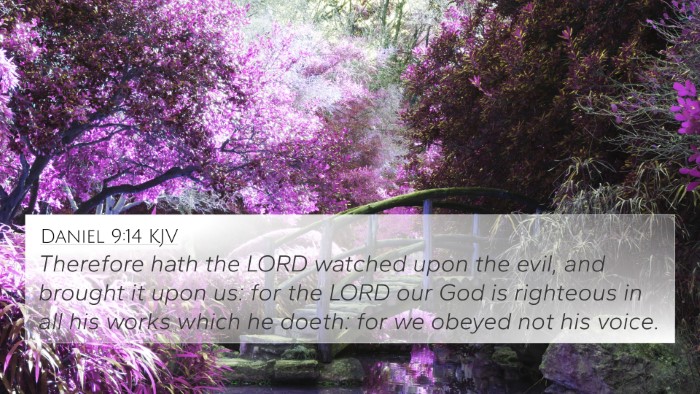
Daniel 9:14 (KJV) »
Therefore hath the LORD watched upon the evil, and brought it upon us: for the LORD our God is righteous in all his works which he doeth: for we obeyed not his voice.
Amos 3:5 Verse Analysis and Similar Verses
Understanding Amos 3:5: A Comprehensive Analysis
Verse: Amos 3:5 - "Can a bird fall on a snare upon the earth, where no gin is for him? shall one take up a snare from the earth, and have taken nothing at all?"
Summary of the Verse Meaning
This verse, found in the prophetic text of Amos, emphasizes the consequences of actions and God's sovereignty in judgment. Amos uses a metaphorical question to illustrate that just as a bird would not fall into a trap unless there was a reason for it, so too will Israel face consequences due to its sins. The essence of this verse speaks to the unavoidable nature of divine justice and the inescapable call to accountability.
Commentary Insights
Matthew Henry's Commentary
Matthew Henry underscores that this verse highlights the idea of inevitability in divine judgement. Just as physical traps require bait, disobedience to God leads to inevitable repercussions. Henry reflects on the prophetic nature of Amos reminding Israel of their sins and calling them to repentance.
Albert Barnes' Notes
Albert Barnes notes that the imagery of the bird and the snare represents the warning against complacency in sin. The verse stresses that God’s judgments are deliberate and result from the sinful actions of His people. Barnes draws attention to God's role as a righteous judge, who will not let the guilty go unpunished.
Adam Clarke's Commentary
Adam Clarke elaborates on the metaphor of the snare, suggesting that it serves to illustrate the principle of causation in divine judgment. Clarke points out that the Hebrew text indicates a relationship between sin and its consequences, emphasizing that Israel's transgressions are the reason for their impending doom.
Key Themes
- Consequences of Sin: The connection between actions and repercussions is central to understanding God's justice.
- Divine Sovereignty: God's control over events and His role as a judge demonstrates the seriousness of His warnings.
- Call to Repentance: The prophetic message urges the people of Israel to recognize their sins and turn back to God.
- Imagery of Judgment: The use of daily life imagery makes the message relatable and urgent.
Bible Cross-References
- Proverbs 26:27 - "Whoso diggeth a pit shall fall therein: and he that rolleth a stone, it will return upon him."
- Galatians 6:7 - "Be not deceived; God is not mocked: for whatsoever a man soweth, that shall he also reap."
- Psalm 7:15 - "He made a pit, and digged it, and is fallen into the ditch which he made."
- Job 4:8 - "Even as I have seen, they that plow iniquity, and sow wickedness, reap the same."
- Isaiah 59:2 - "But your iniquities have separated between you and your God..."
- Matthew 7:2 - "For with what judgment ye judge, ye shall be judged..."
- Romans 3:19 - "Now we know that what things soever the law saith, it saith to them who are under the law: that every mouth may be stopped, and all the world may become guilty before God."
Comparative Analysis of Related Verses
When examining Amos 3:5 in relation to other scriptures, one finds substantial thematic connections. For instance, both Galatians 6:7 and Proverbs 26:27 explore the principle of reaping what one sows. This resonance highlights a core Biblical principle: that the actions of individuals, particularly in a spiritual context, lead to direct consequences under divine authority.
Exploring Inter-Biblical Dialogues
This verse can invoke a deeper understanding when aligning it with other texts across both the Old and New Testaments. For example, examining the theme of judgment in Amos could lead to discussions on the teachings of Jesus regarding moral accountability, such as in Matthew 7:2. Both verses align in indicating that God’s judgment is fair and merit-based, reinforcing the importance of accountability before God.
Thematic Connections through Cross-Referencing
Thematic Bible verse connections, as found in cross-referencing studies, can illuminate the spiritual lessons imparted in Amos 3:5. Using tools for Bible cross-referencing, believers can uncover parallels and deepen their understanding of the nature of God, His justice, and the call for repentance across various Scriptures.
Tools for Effective Cross-Referencing
Utilizing a Bible concordance or a Bible cross-reference guide can significantly enhance your study experiences, allowing for an easier identification of related verses. Methods for cross-referencing Bible studies provide invaluable resources for anyone seeking to uncover deeper relationships between different biblical texts.
Conclusion: Embracing the Depth of Scripture
In conclusion, Amos 3:5 serves as a powerful reminder of the interconnectedness of divine judgment and human action. By embracing cross-referencing methodologies and engaging in thematic studies, one can appreciate the profound wisdom within Scripture, fostering a richer spiritual life and a deeper understanding of God’s Word.
